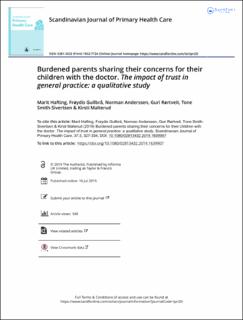| dc.contributor.author | Hafting, Marit | |
| dc.contributor.author | Gullbrå, Frøydis | |
| dc.contributor.author | Anderssen, Norman | |
| dc.contributor.author | Rørtveit, Guri | |
| dc.contributor.author | Smith-Sivertsen, Tone | |
| dc.contributor.author | Malterud, Kirsti | |
| dc.date.accessioned | 2020-03-25T15:33:08Z | |
| dc.date.available | 2020-03-25T15:33:08Z | |
| dc.date.created | 2019-10-08T14:26:08Z | |
| dc.date.issued | 2019 | |
| dc.identifier.citation | Scandinavian Journal of Primary Health Care. 2019, 37 (3), 327-334. | |
| dc.identifier.issn | 0281-3432 | |
| dc.identifier.uri | https://hdl.handle.net/11250/2648678 | |
| dc.description.abstract | Objective: The aim of this study was to recognise the preconditions experienced by general practitioners (GPs) in addressing the children’s needs when ill and substance abusing parents consult for their own health problems.
Design: Qualitative analysis of 38 case stories told by GPs in focus group interviews.
Setting: Focus group interviews of four continuing medical education groups for GPs in western Norway.
Subjects: 27 GPs (nine females) with at least 5 years’ experiences in general practice.
Results: Different aspects of the GPs’ perceived mandate of trust from the parents was a precondition for the children’s situation to be addressed. In some case stories the participants took an open mandate from the parent for granted, while in others they assumed that the parent did not want to discuss their family situation. Sometimes the participants had faith that by continuing with their ordinary GP tasks, they might obtain a more open mandate of trust. Their evaluation of the mandate of trust seemed to impact on how the GP could adopt a mediating role between the parents and various support agencies, thus supporting children who were at risk.
Discussion/conclusion: The children most at risk may remain invisible in GPs’ encounters with their parents, possibly because their parent’s health problems and overall situation overshadow the children’s situation. The mandate of trust from burdened parents to GPs can be a fruitful concept in understanding the interaction regarding the welfare of the parent’s children. Negotiating the mandate of trust with parents by explicitly addressing trust and having an ongoing discussion about the mandate and its limits might be an option to secure the children support if necessary. | |
| dc.language.iso | eng | |
| dc.rights | CC BY 4.0 | |
| dc.rights.uri | http://creativecommons.org/licenses/by/4.0/ | |
| dc.title | Burdened parents sharing their concerns for their children with the doctor. The impact of trust in general practice: a qualitative study | |
| dc.type | Peer reviewed | |
| dc.type | Journal article | |
| cristin.ispublished | true | |
| cristin.qualitycode | 1 | |
| dc.identifier.doi | 10.1080/02813432.2019.1639907 | |
| dc.identifier.cristin | 1735000 | |
| dc.source.journal | Scandinavian Journal of Primary Health Care | |
| dc.source.volume | 37 | |
| dc.source.issue | 3 | |
| dc.source.pagenumber | 327-334 | |

